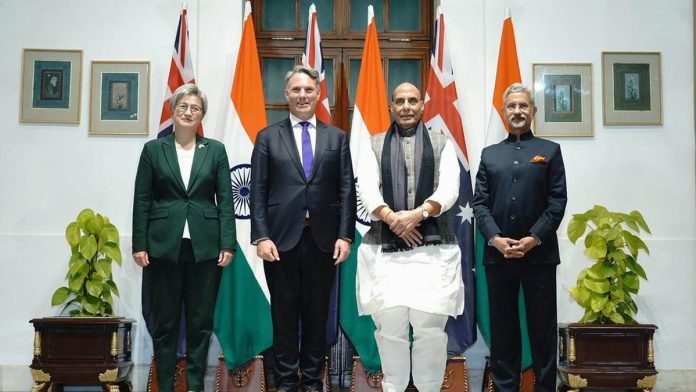For both Australia and India, China is the biggest trading partner, and China is our “biggest security anxiety”, said Australian Deputy Prime Minister and Defence Minister Richard Marles, making the opening remarks at the 2+2 dialogue on Monday. Australian Foreign Minister Penny Wong said this is a partnership which is “consequential for us, but it is crucial for our region.”
Defence Minister Rajnath Singh said there is consensus on both sides that a strong India-Australia partnership will augur well, “not just for the usual benefit of both our countries but also for the overall peace, security and prosperity of the Indo-Pacific.” Defence in particular has become one of the “most important pillars” of the strategic partnership, Mr. Singh noted, to which Mr. Marles concurred, and said it is very much part of the “bedrock” of the bilateral relationship.
Noting that the bilateral relationship has certainly grown rapidly, External Affairs Minister S. Jaishankar said it also has larger implications for the region and a “lot of other countries look to us and to our relationship in many ways as a factor of stability and security.” This, he said, happened at a time when there is increasing uncertainty in the world. “We are seeing sharper polarisation, deeper stresses and today it is important to ensure that the routine is there for the region to feel safer…”
“This is a partnership which is consequential for us, but it is crucial for our region. And we see you, India, as central, crucial to the sort of region we continue to work for — peaceful, stable, prosperous and where sovereignty is respected and we look forward in this discussion to going further on the ways in which we can both work together…,” Ms. Wong said.
Mr. Marles who reached India on Sunday and watched the cricket world cup final in Ahmedabad, said in a contemporary sense, the “home of cricket now really is in India.” Describing himself as a cricket enthusiast, he stated, “I think for those of us who like cricket, the pilgrimage that we all want to make now is to this country and it was just a fulfillment of a long term dream for me to be able to actually watch cricket being played here in India.”
Strategic alignment
And the shared love of this sport by both the countries embodies the state of the bilateral relationship, Mr. Marles said. “We are two countries which share history, we share democratic traditions, we share rule of law, freedom of speech… Well our strategic alignment is greater than it has ever been.” He also held bilateral talks with Mr. Singh and Mr. Jaishankar earlier in the day. “We share an ocean, and in that sense, we are neighbours,” Mr. Marles added.
The relationship has seen a transformation in recent years, which was noted by the Ministers. Talking of the milestones, Mr. Jaishankar referred to the Economic Cooperation and Trade Agreement (ECTA) which entered into force last December, and said they are seeing its economic implications unfold this year in terms of trade increase.
On Tuesday, Mr. Jaishankar and Ms. Wong will hold the 14th Foreign Ministerial Framework Dialogue (FMFD) where the progress on the ongoing negotiations for a Comprehensive Economic Cooperation Agreement (CECA) will also be reviewed.
Mr. Jaishankar also said that they are facing “exceptional challenges”, some regional, some global, many of them involve “challenges to the rule of law” and as comprehensive strategic partners it is important to also “plan” for those exceptions, which could be man-made exceptions, or humanitarian assistance and disaster relief situations. It’s important that we have a “culture of cooperation” in order to respond, he stressed.
“Four, partnership in the Quad format has been very beneficial for the Indo-Pacific region and indeed for our own bilateral relationship,” Mr. Jaishankar added.
On the tempo of engagements, Mr. Jaishankar said the two Prime Ministers have met five times this year, trice in each other’s countries and in other occasions as well. In this regard, Ms. Wong said that since they were elected there were some 19 ministerial visits to India by their government.









































